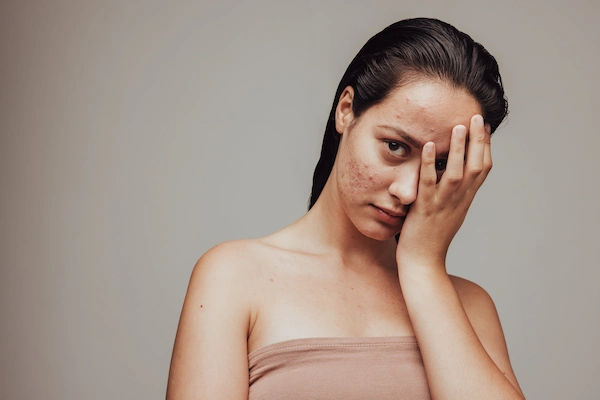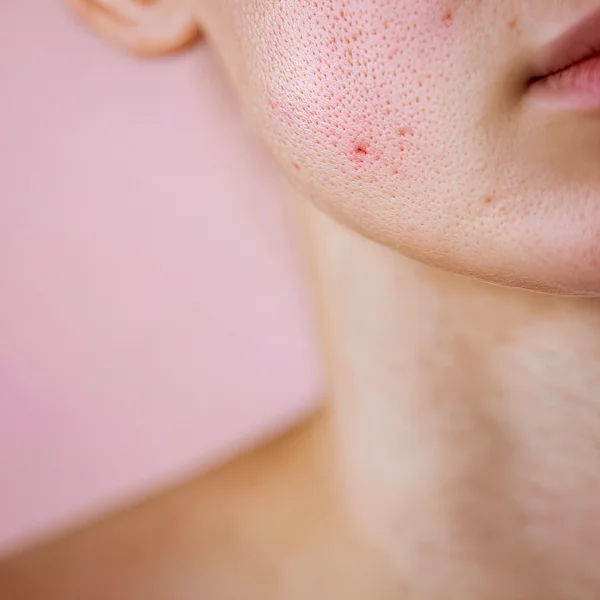How to Reduce Body Acne: Causes, Cure & Treatment
Learn about body acne and its types alongside the remedial measures, effective skincare routines, and treatment options. Achieve clearer, healthier skin with expert advice and practical solutions for managing body acne.

Written by
Last updated on 3rd Jul, 2025
Body acne is a predominant chronic skin condition similar to facial acne that often appears on the back, shoulders, chest, and buttocks. This condition can take many forms, from minor cases to severe inflammation as well as cyst formation. The leading causes that trigger this condition include the build-up of oil, bacteria in blocked pores, hormonal imbalances, genetics, sweating, and dead skin cells.
Those dealing with body acne may face discomfort that can eventually hamper their mental health and lead to awkwardness and depression. Research shows that about 66% of teens and young adults have body acne. This article will provide essential tips for managing and reducing body acne through good skincare, lifestyle adjustments, and professional help.
What is Body Acne?
Acne is an inflammatory skin condition involving sebaceous glands that produce oil and connect to hair follicles. In healthy skin, these glands release sebum through pores, which are openings in the follicles. Now:
The follicles are lined by skin cells called keratinocytes. Normally, as skin cells die, keratinocytes move to the skin's surface.
In case of acne, hair, oil, and keratinocytes clump together in the pore. This blockage prevents keratinocytes from shedding and prevents oil from reaching the skin's surface.
The trapped oil and cells provide a conducive environment for bacteria to thrive, which causes inflammation, swelling, and redness in the affected area.
When the blocked follicle ruptures, it releases bacteria, skin cells, and oil into the surrounding skin, which causes pimples or lesions.
Risk Factors that Trigger Body Acne
Following are the major risk factors that can cause body acne in an individual:
Age
Sleeping patterns
Dietary habits
Stress levels
Drug consumption
Alcohol intake
Weight gain
Poor hygiene
Excessive sweating
Genetic predisposition
Menstrual cycle irregularity
Certain medications having lithium, steroids, and anticonvulsants
Wearing tight shoulder pads, backpacks, underwire bras, etc.
Smoking
Apart from these, disorders like polycystic ovarian syndrome (PCOS) can cause hormonal changes, leading to acne.
Effective Skincare Routines to Prevent Body Acne
Here are some effective ways to treat and prevent body acne:
Avoid Comedogenic Products: Refrain from using any oils, waxes, or silicone-laden body and hair products that could block pores. Select non-comedogenic or non-acnegenic products instead.
Use Protective Padding: Sportspersons should use protective padding to minimise friction from the sporting gear. They can wear loose-fitting clothes and consider cleaning their sporting equipment regularly. Also, they should always wear moisture-wicking fabric and avoid sharing their sports equipment.
Use Sunscreen: To protect the skin from the sun, use an oil-free broad-spectrum sunscreen that has an SPF (Sun Protection Factor) of 30 or higher. This helps keep the skin from developing acne due to sunburn or excess oily secretion.
Wash Personal Use Items Regularly: Periodically cleanse things like pillowcases, bedsheets, sporting apparel, and equipment to stop sweat, oils, and bacteria from building up on the skin and contributing to acne.
Maintain Proper Hygiene: People need to shower regularly and use a gentle, non-drying cleanser. Also, they should put on clean, dry clothes after a workout to give their skin a good chance to breathe.
Choosing the Best Body Wash and Cleanser: The right body washes containing gentle ingredients such as salicylic acid or benzoyl peroxide will help clean pores and decrease inflammation. Avoiding the usage of harsh soaps will also prevent stripping away the natural oils from the skin, which could lead to more breakouts.
Exfoliation: People should exfoliate the skin to remove dead cells that help open the skin pores, thus preventing acne. Exfoliating 1-3 times a week is essential to have a healthy and smooth skin.
Moisturising Skin: Using an oil-free, non-comedogenic moisturiser is best because it does not clog the pores. This will balance the natural oils to prevent both dryness and surplus oil that could result in acne.
Over-the-Counter Treatments for Body Acne
Following are the most common tropical medications utilised for the treatment of body acne:
Retinoids (Tretinoin, Adapalene, Tazarotene): These are effective in moderate acne and prevent clogging of hair follicles. Apply at night, beginning 3 times a week. However, they tend to dry the skin and increase sun sensitivity, particularly in darker-skinned individuals.
Antibiotics (Clindamycin, Erythromycin): These reduce bacteria, redness, and inflammation. Often used in combination with benzoyl peroxide to avoid resistance. Apply in the morning and with retinoids in the evening.
Salicylic Acid: Being a pore-cleansing agent, salicylic acid is widely used to manage discolouration that occurs with several types of acne.
Azelaic Acid: This natural antibacterial medicine is ideal for acne and hyperpigmentation.
Dapsone (Aczone): It is an anti-inflammatory agent that is more useful for women.
Prescription Treatments for Body Acne
Here is a list of the best oral medications for the treatment of acne:
Sotretinoin (Accutane)
Doxycycline (a tetracycline antibiotic)
Minocycline (another tetracycline antibiotic)
Spironolactone (for hormonal acne in women)
Yaz or Ortho Tri-Cyclen
If the over-the-counter products do not work or if the body acne is severe, individuals should consider visiting a dermatologist. A doctor can diagnose the patient’s case and provide the best advice regarding the oral treatments to manage the body acne.
Lifestyle Changes for a Clean and Healthy Skin
Here are the major lifestyle-changing practices one can follow to get rid of body acne:
Maintain good hygiene practices like bathing regularly, especially after sweating or exercising.
Consider wearing loose clothes made of breathable fabrics like cotton to allow the skin to breathe and reduce irritation.
Practise yoga, deep breathing, and meditation and get enough rest to manage stress.
Natural Home Remedies to Cure Body Acne
Following are some of the best natural home remedies for body acne:
A honey and cinnamon mask with its antibacterial properties can combat acne-causing bacteria and reduce inflammation.
Spot treatment by mixing tea tree oil with carrier oil can help reduce redness and swelling.
Aloe vera gel can be very useful in calming inflamed skin and promoting the healing of active acne and scar tissue.
Apple cider vinegar can be used to balance skin pH (potential of hydrogen) and exfoliate dead skin cells, preventing clogged pores.
One can use a turmeric and yoghurt mask to reduce redness, brighten skin, and help fade acne scars.
Cool green tea toners help flush out clogged pores and reduce sebum production.
Common Misconceptions About Body Acne
Here are three common misconceptions among people regarding body acne:
Myth 1: Body Acne Always is Associated with Hygiene
The cause of body acne is not always improper hygiene habits. Several factors also lead to acne, such as the use of synthetic fabrics and dangerous chemicals in some clothing or body products.
Clothes may contain chemicals such as tributyl phosphate or dimethyl fumarate, which can irritate the skin. Tight, non-breathable or synthetic fabrics can trap sweat and bacteria, creating the perfect habitat for acne.
Myth 2: If Anyone Has Body Acne, They Need to Scrub Harder
Scrubbing too much and too hard can damage the skin barrier and eventually worsen the condition of acne. While exfoliation is necessary for almost all skin problems, too much cleansing or using aggressive scrubs on inflamed skin can worsen inflammation.
People with body acne should always apply a moisturiser after showering to lessen skin issues and foster smooth skin.
Myth 3: Body Acne is Caused by Body Weight
Being overweight can affect hormonal balance and cause inflammation, which may play a role in acne. However, it is not the direct reason every time. Body acne can appear in individuals of any weight as hormonal changes and skin irritation can occur in everyone. Losing body weight is not a confirmed way to clear up acne.
Conclusion
In a nutshell, dealing with body acne requires combining consistent skincare with lifestyle modifications and professional treatments when required.
Keys to managing acne include identifying triggers, hygiene, and proper products. If Over-the-Counter (OTC) treatments and lifestyle changes are not showing improvements, individuals should see a dermatologist for a customised treatment plan.
Consult Top Dermatologist
Consult Top Dermatologist
Dr. Kavitha Killaparthy
Dermatologist
23 Years • MBBS,DIPLOMA(DERMATOLOGY,VENEREOLOGY,LEPROSY)
Hyderabad
JDS Skin & Hair Clinic, Hyderabad
Dr. Mayuri Jain
Dermatologist
11 Years • MBBS, MD Dermatology , Venereology & Leprosy
Delhi
Dr Mayuri Jain Clinic, Delhi

Dr Ekansh Shekhar
Dermatologist
10 Years • MBBS MD
Lucknow
Apollo Clinic Hazratganj, Lucknow
Dr.j Girishma
Dermatologist
6 Years • MBBS MD DERMATOLOGY
Bengaluru
Apollo Medical Center, Marathahalli, Bengaluru
Dr. Praveen Kumar
Dermatologist
5 Years • MBBS, MD DVL
Yenugonda
SVS Hospital ., Yenugonda


